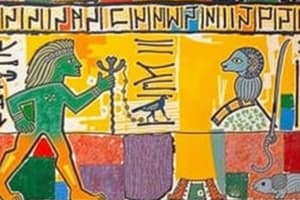Podcast
Questions and Answers
What was fundamental to the early history of science in the ancient period?
What was fundamental to the early history of science in the ancient period?
- The study of alchemy
- The invention of the telescope
- The belief in a flat Earth
- The combination of religion and astronomy (correct)
Where was the system of writing known as Cuneiform first developed?
Where was the system of writing known as Cuneiform first developed?
- Ancient Egypt
- Ancient Greece
- Ancient China
- Ancient Sumer in Mesopotamia (correct)
Who suggested that the Earth was at the center of the universe in about 400 BC?
Who suggested that the Earth was at the center of the universe in about 400 BC?
- Ancient Greeks
- Ancient Egyptians
- Ancient Indians
- Mesopotamians (correct)
Which ancient civilization contributed to the development of ideas in mathematics, astronomy, and logic?
Which ancient civilization contributed to the development of ideas in mathematics, astronomy, and logic?
Who was known for piecing together the sense of 'order' in nature and developing ideas in science?
Who was known for piecing together the sense of 'order' in nature and developing ideas in science?
What was fundamental to the early history of science in various ancient civilizations?
What was fundamental to the early history of science in various ancient civilizations?
What did the Mesopotamians suggest about the universe around 400 BC?
What did the Mesopotamians suggest about the universe around 400 BC?
Who developed the system of writing known as Cuneiform?
Who developed the system of writing known as Cuneiform?
Which ancient civilization made significant contributions to the development of ideas in mathematics, astronomy, and logic?
Which ancient civilization made significant contributions to the development of ideas in mathematics, astronomy, and logic?
Who was known for piecing together the sense of 'order' in nature and developing ideas in science?
Who was known for piecing together the sense of 'order' in nature and developing ideas in science?
Flashcards are hidden until you start studying
Study Notes
Early History of Science
- Early history of science was centered on observation and the natural world, leading to foundational experiments and theories.
- Development of systematic inquiries about nature formed the basis for later scientific methods.
Cuneiform Writing
- Cuneiform was first developed in ancient Mesopotamia, primarily by the Sumerians.
- This writing system became one of the earliest forms of written expression, used for record-keeping and literature.
Earth-Centric Universe
- Around 400 BC, the philosopher Anaxagoras suggested that the Earth was at the center of the universe.
- This geo-centric view influenced subsequent astronomical models until the heliocentric theory emerged.
Contributions of Ancient Civilizations
- The ancient Greeks significantly contributed to mathematics, astronomy, and logic.
- Notable figures include Pythagoras and Euclid, who laid the groundwork for mathematics, while Aristotle made strides in logical reasoning.
Order in Nature
- Aristotle was pivotal in articulating a sense of 'order' in nature, merging scientific inquiry with philosophical thought.
- His contributions spanned various fields, solidifying the connection between science and philosophy.
Mesopotamian Universe Perspectives
- The Mesopotamians held a view of the cosmos involving gods controlling natural phenomena.
- They implemented astronomical observations, leading to early calendars and predictive models of celestial patterns.
Development of Cuneiform
- The Sumerians were the original developers of the Cuneiform system, primarily for administrative and commercial purposes.
- Over time, it evolved to allow for more complex forms of communication, including literature and scientific texts.
Studying That Suits You
Use AI to generate personalized quizzes and flashcards to suit your learning preferences.




